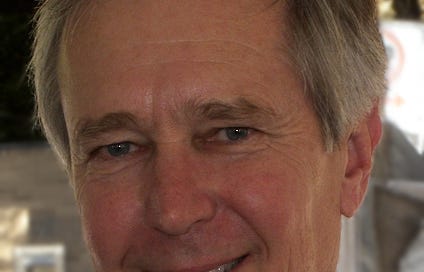What Did You Do In the Trump Putsch, Daddy?
Don't expect America's political, business, and academic leaders to fight Trump for you. History tells us the privileged almost never act courageously because they have too much to lose.
James Fallows. Photo by Larry D. Moore.
In 1975 my friend and onetime boss James Fallows wrote what remains, I think, the most influential essay ever published by The Washington Monthly. It was about the dishonor the children of privilege brought on themselves when they evaded the Vietnam draft. The dishonor, Jim argued, had nothing to do with any moral rightness in the Vietnam war, which was nonexistent. Rather, it was that these children of privilege arranged matters in such a way that “the boys from Chelsea,” by whom Fallows meant the working class, went to Vietnam in their place.
The poet Robert Lowell paid the price of conscientious objection during World War II by serving time in federal prison; so did the civil rights leader Bayard Rustin. Muhammed Ali lost his heavyweight title and nearly went to jail for refusing induction in the Vietnam War (“No Viet Cong ever called me nigger”). A few people (my former Wall Street Journal and Politico colleague David Rogers among them) opposed the Vietnam war but enlisted as battlefield medics, a route even more dangerous than acceding to the draft. Fallows wasn’t writing about these unusually brave and forthright souls. He was writing about people like, well, himself, who demonstrated to their draft boards that they knew well enough how to work the system that it wouldn’t be worth their trouble to try to make them into soldiers. I avoided this moral test by being born eight years after Jim (the Vietnam draft ended shortly after I turned 15).
Fallows titled his essay “What Did You Do In the Class War, Daddy?” Here’s its conclusion: “The behavior of the upper classes in so deftly avoiding the war’s pains is both a symptom and a partial cause of the class hatred now so busily brewing in the country.”
In some ways Jim’s observations from 50 years ago proved wrong. Every candidate of that generation who made it into the White House flunked this moral test, and after Dan Quayle and Bill Clinton nobody paid it much attention. On the other hand, Fallows never predicted that draft-evading Boomers would later pay a price; his point was that they didn’t seem likely to pay any price at all. The children of privilege, Jim included, flourished—and the working class seethed. The decline in respect for American leaders and institutions had already begun when Fallows wrote the piece. Now it’s given us Donald Trump.
My latest New Republic essay is about the ruling class’s remarkable luck during my lifetime in avoiding the sort of moral test Fallows wrote about. As best I can recall, the Vietnam draft was the only one, and if anything it was the few brave ones who were denied power. (No Vietnam veteran has ever been president, and at this late date it’s doubtful any will.) I bring this up not to dwell on the past but to acknowledge the extreme novelty of the current situation, wherein America’s leadership class is being tested about whether it will defy Donald Trump. I was as surprised as anyone to see it flunk (a laudable exception is Princeton President Christopher Eisgruber), but I shouldn’t have been. Moral cowardice is the default setting for the leadership class. I remembered this as I reread Fallows’s essay, flipped through my battered copy of JFK’s Profiles in Courage, and skimmed a published transcript (rescued from my late parents’ house before we sold it) of the 1969 documentary The Sorrow and the Pity (this last a book somebody gave me when I was a teenager). Heroism is the exception, and it’s especially the exception among leaders. That’s why we revere it. Please read my piece here.





Before even reading your piece in TNR, this post involving Fallows was excellent.
In June 1964, I married my college boyfriend; in August, the Gulf of Tonkin "incident" put the war in Vietnam in our headlights. After graduation in 1965, we moved to L.A., where he had been accepted at the USC Grad School of Business (He was 1-A; there was no student deferment for business grad school). After one semester, he changed to get a second undergrad degree in engineering. Again, no deferment for getting a second bachelor's. He remained 1-A. he became an engineer; we divorced, no kids, end of story. Except that "miracle" of 8 years of war with a 1-A deferment...? About ten years ago, or so, maybe more, the building that had been, in the '70s, the site of the Palo Alto Selective Service Office, was demolished. And when it was....several hundred files of potential draftees were found hidden behind a wall behind a hanging picture. .... The files of the white boys whose fathers--who played golf together at the posh courses along the Peninsula-- knew of the employee at the SSO who, for what? $500? Less? shoved the physical files of their sons into a wall, and drafted the Black sons from East Palo Alto to serve and die in their place. (Everything except the "found files" in this account is anecdotal and conjecture on my part. There was no investigation, no public outcry.)